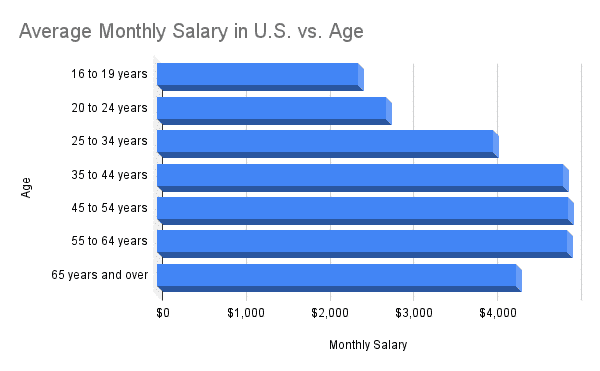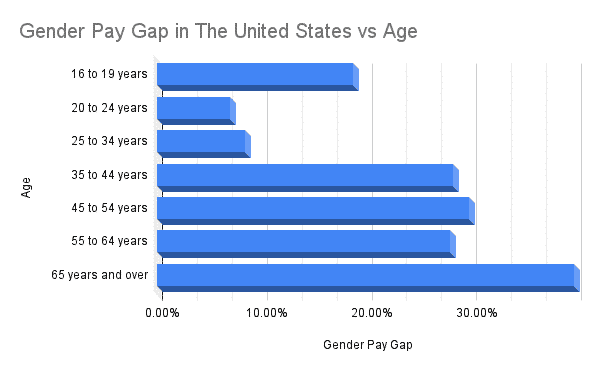Every year the U.S. Census Bureau (USCB), Bureau of Labor and Statistics (BLS), and Bureau of Economic Analysis (BEA) released their latest National Statistics. It offers insight into the average salary and wage in the United States according to different factors.
Multiple factors can impact your salary and compensation, and understanding these factors can benefit you in your job search and career planning.
We will discuss the average salary in the United States and explain a few main factors that will influence your compensation.
Average Salary Income By State in the United States
Geographical location is a major factor that influences your expected pay and compensation, workers in the same occupation, and position can vary greatly from one state to another. The difference in the salary is due to the function of the cost of living, tax rate, and type of industry.
Average Annual Salary by State in the U.S. (Map)
Interactive Map: Average Salary of the United States by States.
Which is the State with the Highest Average Salary?
Maryland is the state with the highest average salary in the U.S., an average employee has an average salary of $94,384.
Employees who work in Maryland enjoy the benefit of earning 109.9% more than their counterparts living in the lowest-earning state, and 40.67% more than their counterparts in the median earning state.
State With The Highest Average Salary
The top five states with the highest average salary are Maryland, the District of Columbia, New Hampshire, Massachusetts, and New Jersey, with an average salary ranging from $85,239 to $94,384.
| State Name | Average Salary |
|---|---|
| Maryland | $94,384 |
| District of Columbia | $88,311 |
| New Hampshire | $88,235 |
| Massachusetts | $86,725 |
| New Jersey | $85,239 |
| Utah | $83,670 |
| Colorado | $82,611 |
| Virginia | $81,947 |
| Washington | $81,083 |
| Hawaii | $80,729 |
Which is the Poorest State in the United States?
Mississippi is the state with the lowest average salary in the U.S., an average employee has an average salary of $44,966.
Employees who work in Mississippi earn 52.36% less than their counterparts living in the highest-earning state, and 32.98% less than their counterparts living in the median earning state.
State With The Lowest Average Salary
The five states with the lowest average salary are Mississippi, Arkansas, New Mexico, Louisiana, and West Virginia with an average salary ranging from $44,966 to $51,615.
| State Name | Average Salary |
|---|---|
| Mississippi | $44,966 |
| Arkansas | $50,540 |
| New Mexico | $50,822 |
| Louisiana | $50,935 |
| West Virginia | $51,615 |
| Oklahoma | $52,341 |
| Alabama | $54,393 |
| Tennessee | $54,665 |
| Montana | $56,442 |
| Kentucky | $56,525 |
Average Salary Income by Age in the United States
Employees of age 16 years old to 64 years old see a gradual increase in the average salary as they grow older. The increase in the average salary is a reflection of the individual’s increase in their experience, skills, education, and relevance in the field.
Average Salary By Age in the United States
| Age Group | Hourly | Weekly | Monthly | Annual |
|---|---|---|---|---|
| 16 to 19 years | $14 | $555 | $2,405 | $28,860 |
| 20 to 24 years | $16 | $633 | $2,743 | $32,916 |
| 25 to 34 years | $23 | $928 | $4,021 | $48,256 |
| 35 to 44 years | $28 | $1,119 | $4,849 | $58,188 |
| 45 to 54 years | $28 | $1,134 | $4,914 | $58,968 |
| 55 to 64 years | $28 | $1,130 | $4,897 | $58,760 |
| 65 years and over | $25 | $989 | $4,286 | $51,428 |
The data shows employees with age 45 to 54 show to be the prime age when you can earn the most at $58,968 per annual, and employees who are within the age group of 16 to 19 earn the least at $28,860 per annual.

When starting your career at a young age of 16 to 19, you are inexperienced, without the relevant education and skills thus employees in this age group are not paid highly, with an hourly wage of just $14 per hour.
As you age and grow in your experience, skills, and education, you will reach your prime ability to earn in your 40s when you will receive an hourly wage of $28 per hour.
Average salary in the U.S. by Age and Gender
When looking at the average salary in the United States, it is important to break it down by age and gender in order to get a clear picture of the average salary you will be expecting to get.
Average Men’s Salary by Age
| Age Group (Men) | Hourly | Weekly | Monthly | Annual |
|---|---|---|---|---|
| 16 to 19 years | $15 | $595 | $2,578 | $30,940 |
| 20 to 24 years | $16 | $656 | $2,843 | $34,112 |
| 25 to 34 years | $24 | $961 | $4,164 | $49,972 |
| 35 to 44 years | $31 | $1,242 | $5,382 | $64,584 |
| 45 to 54 years | $32 | $1,279 | $5,542 | $66,508 |
| 55 to 64 years | $31 | $1,246 | $5,399 | $64,792 |
| 65 years and over | $29 | $1,141 | $4,944 | $59,332 |
The average hourly wages were $15 to $32 for men ages 16 and over, a weekly earning of $595 to $1,279, a monthly salary of $2,578 to 5,542, and an annual compensation package of $30,940 to $66,508.
Average Female Salary by Age
| Age Group (Women) | Hourly | Weekly | Monthly | Annual |
|---|---|---|---|---|
| 16 to 19 years | $13 | $501 | $2,171 | $26,052 |
| 20 to 24 years | $15 | $613 | $2,656 | $31,876 |
| 25 to 34 years | $22 | $886 | $3,839 | $46,072 |
| 35 to 44 years | $24 | $968 | $4,195 | $50,336 |
| 45 to 54 years | $25 | $985 | $4,268 | $51,220 |
| 55 to 64 years | $24 | $973 | $4,216 | $50,596 |
| 65 years and over | $20 | $816 | $3,536 | $42,432 |
The average hourly wages were $13 to $25 for women ages 16 and over, a weekly earning of $501 to $985, a monthly salary of $2,171 to $4,268, and an annual compensation package of $26,052 to $51,220.
Pay Gap by Gender and Age
Men get paid on average 22.9% more than a woman who is from the same age group. The pay gap range from 7.01% to 39.83%.
| Age Group | Annual Salary (Men) | Annual Salary (Women) | Pay Gap |
|---|---|---|---|
| 16 to 19 years | $30,940 | $26,052 | 18.76% |
| 20 to 24 years | $34,112 | $31,876 | 7.01% |
| 25 to 34 years | $49,972 | $46,072 | 8.47% |
| 35 to 44 years | $64,584 | $50,336 | 28.31% |
| 45 to 54 years | $66,508 | $51,220 | 29.85% |
| 55 to 64 years | $64,792 | $50,596 | 28.06% |
| 65 years and over | $59,332 | $42,432 | 39.83% |
The main reason why the pay gap exists is that men are generally the breadwinner of the family. Traditional gender norms suggest that men are expected to be the breadwinner in a relationship, taking care of the financial aspect of the family, whereas the other spouse takes care of the emotional aspect of the family.
This is shown by the increase in the pay gap after the age group of 20 to 24 years old (7.01%), 35 to 44 years old (28.31%), and finally at 65 years and over (39.83%).

Women are narrowing the gender pay gap as more women are becoming the breadwinner of the family, increasing from 67% of the hourly wage of men to the current 82% of the hourly wage of men as shown by the data.
4 Main Factors that Determine Your Salaries and Wages
The level of compensation that employees receive is determined by a number of factors, but in general, these 4 factors will have the greatest impact on the salary and wages.
Education
Education is probably the most important factor that determines salaries and wages. A person’s education level can have a significant impact on how much money they make. A college degree often leads to higher-paying jobs, while a high school diploma often leads to lower-paying jobs.
U.S. Bureau of labor statistics reported:
- Bachelor’s degrees or higher earn a median income of $1,467 per week.
- College or associate degrees earn a median income of $931 per week.
- High school graduates with no college earn a median income of $831 per week.
- Less than a high school diploma earn a median income of $651 per week.
There are many different factors that contribute to how much money someone makes, but education is one of the most important.
Experience
Experience level is one of the most important factors that determine salaries and wages. The level of experience and skills of an employee correlates with the age of the employee. This correlation is not the causation but the probability of the employee gaining the required skills and experience to perform well in his or her job.
Generally, people with more experience earn more money than those who have less experience.
However, there are a few exceptions to this rule.
For example, someone with a lot of experience in a specific field may not earn as much as someone with less experience but who is more qualified overall.
Geographical Location
Geographical location is one of the most important factors that determine salaries and wages. Studies have shown that people who live in certain areas earn more than those who live in other areas. This is largely due to the cost of living, which varies depending on the region.
For example, people who live in large cities such as New York or Los Angeles typically earn more than those who live in rural areas. This is because the cost of living is higher in cities than it is in rural areas.
Industry
The industry is a major determinant of salaries and wages. The industry in which someone works affects not only their income but also their career opportunities.
A highly technical field that requires further education and longer training such as healthcare, finance, information technology, or engineering generally get a higher salary.
For example, those who work in the technology sector typically earn more than those who work in retail. This is because the technology sector is a high-demand, high-paying industry.
Other factors that can influence salary are things like the employee’s age, type of employment such as part-time or full-time, as well as the tax rate. Often, employers will use a combination of these factors to determine salaries.
Salary and Wages Vary Due to Many Factors in the Rest of the World as Well
Whether you are in the United States, or any part of the rest of the World, there are many factors that go into determining someone’s salary or wage.
- Controllable Factors. Some of these factors are controllable and can be changed as time passes such as salary that is influenced by the person’s experience, their level of education, and the job market in their area.
- Uncontrollable Factors. Some other factors cannot be changed or controlled such as salary that is influenced by their gender, race, or nationality.
Furthermore, the job market and the economy also play a role in determining wage levels.
The opportunity of choosing to work remotely can give rise to many financial benefits, thus it is important to keep these factors in mind when negotiating a salary.
Finally, it is important to remember that everyone’s situation is different, so it is important to do your own research before making any decisions.
Now Trending:
- 23 Email Etiquette: Professional Communication in Remote Workplace
- How to Do Online Meeting Follow-Up [+12 Follow-Up Meeting Email Templates]
- How to Boost Engagement During Online Meetings During (5 Meeting Engagement Strategies)
- How Write Follow-up Email [8 Email Templates and Examples]
- How to Combat Online Meeting Fatigue [Danger Signs & Solution]
Join over 11,000+ achievers who are committed to achieving their career goals!







